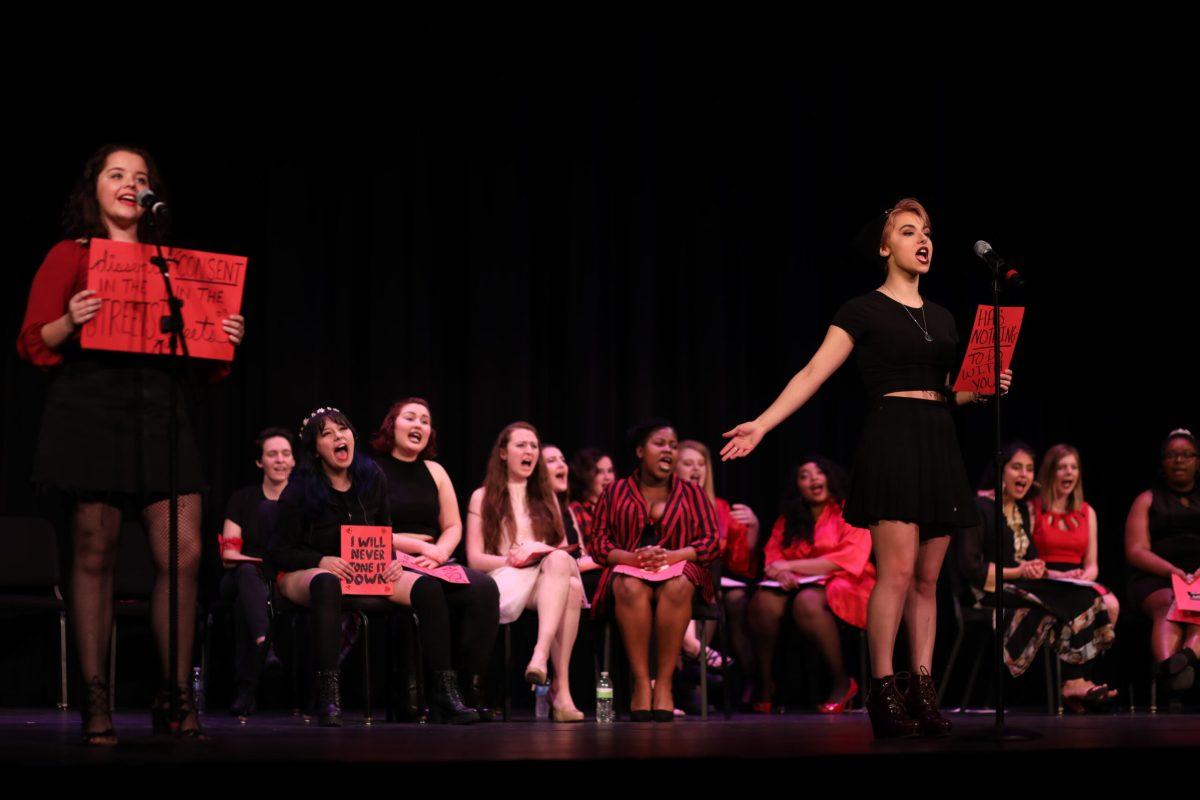
The 16th annual performance of the _Vagina Monologues_ embodied the theme of rise, resist and unite with vulnerable performances that illustrated the strength and perseverance of women at the Missouri Theatre on Feb. 24.
A reflection of current and past trials and successes that women have experienced, the _Vagina Monologues_ held audience members captive through stories of comedy, tragedy and resistance. With prevailing themes of intersectionality and inclusivity, the women demonstrated that there is no one way to be a woman but that they are all linked by the common thread of bravery.
Each performance impacted the audience uniquely. Some inspired rage against mistreatment, some left few audience members with dry eyes and some elicited laughter and bountiful cheers. One such performance that brought laughter and preached self-love was Jalen Stackhouse’s performance of “Because He Liked to Look At It,” in which she tells a story of learning to love her vagina after a man shows her its beauty. Though Stackhouse did not share that experience with her character, she did find familiarity with the idea of learning to love yourself.
“I felt that pressure of feeling like you’re not good enough or something’s wrong, so I could definitely relate to it in that way,” Stackhouse said. “I also related to her [in that I] ended up loving my vagina because I love my pussy now.”
Stackhouse also commented on the bravery of her fellow performers and what performing alongside them meant to her.
“I feel like most women want to be empowered, but not a lot of women have the courage to speak up, come out there and scream ‘c***’ on a stage or be in lingerie,” she said. “It was really empowering to know I’m on a campus with women like this.”
Yet, _The Vagina Monologues_ have not always been empowering for all women. The performance “They/Them” by Sophia Faiella spoke directly to Eve Ensler, the creator of _The Vagina Monologues_, about how transgender women were excluded from the narrative.
“Eve Ensler didn’t think my story deserved to be told,” Faiella said. “My monologue is my battle cry, my battle cry is my resistance.”
For many, the monologues resonated with them as their personal experiences aligned with the stories being told. For some, the show was eye-opening. MU senior Ben Cosgrove discussed the way he felt as a male audience member.
“[It was] more uncomfortable in the fact that I was kind of a grievance rather than this was weird or uncomfortable, more just that I couldn’t empathize or I hadn’t thought of that or considered that,” Cosgrove said.
MU graduate student Madelyne Maag, a first-time audience member and two-time _Vagina Monologues_ performer, discussed the educational value of the performances.
“It’s not only a fun, very entertaining, empowering show; it’s about education and it’s about empowering women specifically about their bodies, no matter what their bodies look like,” Maag said.
She also described what it felt like performing some of the more intense pieces.
“We got really, really emotional, and we would break down sometimes just even performing this, and it’s like, look, we’re doing this for a purpose of getting out the message of this has happened,” she said.
While the majority of the performances were from Ensler’s _The Vagina Monologues_, three of the performances were written and performed by community members, showing great courage on their part. One performance in particular told the terror of the Franco regime in Spain and the pain mothers experienced after finding out their children they once thought dead had actually been stolen for the purpose of the regime. The shock during this performance was heard through the deafening silence of the crowd.
This and many other performances demonstrated a common voice opposing injustice against women. Director of Academic Retention Services and Assistant Vice Chancellor of the Division of Inclusion, Diversity & Equity Donell Young elaborated on the circumstances women often face.
“The reality is on a college campus women are actually outperforming men on so many different levels, but then when you go to outside of college, the disparity in pay just kind of blows my mind,” Young said.
Though Young offered his perspective, he did so reluctantly in fear of taking any of the spotlight away from the most important people of the night: the women who performed.
The monologues addressed more than just injustice in the sectors of opportunity and pay. “Coconut Oil” by Ayesha Vishnani, another community spotlight piece, addressed race. Vishnani questioned how she can learn to love her vagina if she has yet to learn how to love the color of her skin.
One of the most timely and grave issues stressed in the monologues was sexual assault, and in keeping with this theme, the proceeds from the show benefited the MU Stop the Violence Fund. Women broke apart on stage and put themselves together with words of empowerment and defiance, vowing to end the culture that perpetuates the allowance of rape and sexual violence.
“Until the violence stops, we will continue to do this,” said Justine Durham, who performed in “The Wear and Say Lists” and the “Not-So-Happy Fact.”
_Edited by Brooke Collier | [email protected]_